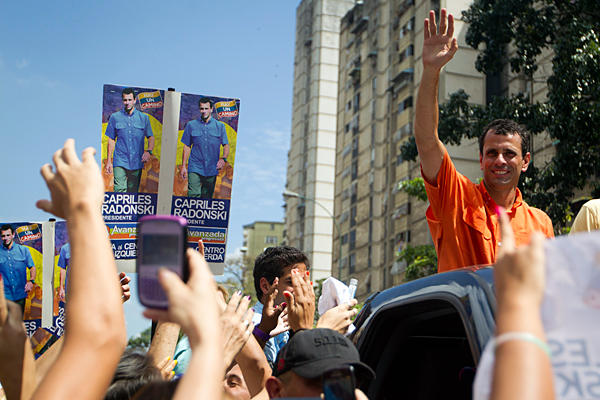
Henrique Capriles Radonski (in orange shirt at right), running opposite President Hugo Chavez in Venezuela’s next presidential election to be held Oct. 7. Capriles was forced to address corruption allegations when a campaign aide was caught on video supposedly taking a bribe. Photo credit: Reuters/Carlos Garcia Rawlins
Mitt Romney isn’t the only presidential candidate having to answer for a controversial event caught on video. The presidential election in Venezuela will take place on October 7, 2012 and corruption is becoming that race’s primary issue.
When Venezuelans go to the polls in less than a month (they will vote using an electronic system and register through fingerprint identification- more advanced voting technology than here in the U.S.) they will choose between leftist President Hugo Chavez and self-described centrist and former lawyer and state governor Henrique Capriles Radonski. Venezuela’s 30 opposition parties have united behind Capriles.
The prevailing opinion seems to be that if anyone could unseat Chavez (whether this could actually happen, or is a pipe dream, is up for debate) it is Capriles, who has made a point of reaching out to Venezuela’s poor and disenfranchised. According to Andrew Rosati of Christian Science Monitor, Capriles is “the most serious challenger President Chávez has faced during his 13 years in office.” Which makes a recent video that surfaced very deflating to Capriles’ supporters.
One of his top campaign aides has been accused of taking a bribe in exchange for political favors, with video evidence to support. The aide denied the charge, but Capriles dismissed him anyway. While some believe Capriles’ bold, definitive (and quick) reaction is encouraging, others feel the scandal will irreparably damage any chance he had to win the election.
Of course corruption is nothing new to Venezuela. Transparency International has found it to be the 2nd-most corrupt nation in the Americas (only Haiti is worse), and 172nd out of 183 countries worldwide. Despite Chavez promising to create a “more authentic democracy” and purge the illicit practices of prior regimes, his regime has been subject to its far share of corruption allegations.
The Chavez government has also been accused of starkly mismanaging Venezuela’s oil industry (it has the largest discovered oil reserves of any country on Earth, more than even Saudi Arabia). Production has declined notably since Chavez arrived in 1998, and money from PDVSA–the state-owned oil company–has been increasingly siphoned off to government “contributions” rather than be put toward necessary infrastructure investments. PDVSA is currently $34 billion in debt, an astounding figure when compared to the $2.5 billion debt it had when Chavez took over in ’98.
Can Capriles recover from the bribery scandal? Did he even have a fighting chance to begin with? We’ll find out in a few weeks. What’s important is that the election proceeds without bias, undue influence, or fraud. A clean election could set a tone for eliminating corruption elsewhere in Venezuela, and creating a more democratic environment.